Our Work
International Medical Relief of Children
The Importance of Pediatric Health for Thriving Communities
Children’s health is one of the most crucial priorities to improve the well-being of any community. Children are the future, and their physical, mental, and emotional health lay the foundation for the long-term success of societies. Ensuring the health of our youngest generation is essential for creating thriving families and communities.
In low- and middle-income countries, improving access to healthcare for children can significantly enhance educational outcomes, reduce long-term healthcare costs, and promote overall community development. When children are healthier, they are more likely to attend school and achieve higher academic success. Additionally, children who receive timely vaccinations, proper nutrition, and basic medical care, such as treatment for common illnesses, grow up with fewer health complications, leading to a stronger and more productive society.
Moreover, educating families about pediatric care—such as the importance of vaccinations, proper nutrition, and disease prevention—ensures that children receive the care they need early in life. When parents, particularly mothers, are equipped with the knowledge and resources to care for their children’s health, it creates a ripple effect of positive change that extends across generations.
That is why International Medical Relief is committed to providing essential medical supplies, holding pediatric clinics, and conducting health education classes. Our goal is to ensure sustainable healthcare that empowers families and communities to raise healthy children and, by extension, build stronger, more resilient societies.
- In 2018 alone, an estimated 6.2 million children and young adolescents under age 15 died, mostly from preventable causes
- Approximately every two minutes a woman dies during pregnancy or childbirth. The majority of these deaths are preventable and when a mother dies, her newborn child is 10 times more likely to die
- When a woman dies in childbirth, her surviving children are ten times more likely to die within two years than those whose mothers remain in the home
Dr. Kevin, a pediatrician, shares a bit about his time in Honduras.
“I feel like after 21 years of medical practice, this has been a transformative experience for me. It’s allowed me at a critical time in my career to reconnect with the main reason I went into medicine. I am grateful to #IMR, my team and the absolutely wonderful people of Honduras”
Deworming
According to the World Health Organization, periodic deworming programs that utilize single-tablet treatments can significantly alleviate the suffering caused by parasitic infections. According to the World Health Organization (WHO), soil-transmitted helminth infections (which include roundworms, whipworms, and hookworms) affect over 1.5 billion people worldwide, with children being particularly vulnerable. The WHO's most recent reports suggest that hundreds of millions of children—mainly in regions with poor sanitation—are in need of preventive deworming treatments.
Parasitic infections, such as those caused by Giardia, contribute to an estimated 200,000 preventable deaths each year. Giardia is highly contagious and can result in severe diarrhea, vomiting, and dehydration—conditions that, if left untreated, can be fatal, especially for infants and young children. However, with timely access to simple treatments, lives can be saved.
In our clinics, it is common to encounter children with distended stomachs due to parasitic infections. IMR strives to combat the harmful effects of parasites and worms by providing essential medications and educating communities on prevention strategies. Through these efforts, we aim to reduce the incidence of parasitic infections and safeguard the health of vulnerable children for the future.
Worms contribute to about 200,000 needless deaths every year. Giardia alone is highly contagious and causes severe diarrhea, vomiting and dehydration. If untreated, this can kill babies and toddlers. Infected people’s lives can easily be saved with simple medicine. In clinics we often see children with extended stomachs from parasites. IMR helps keep parasites and worms from hurting more children by providing simple medicines and basic education to teach how to prevent getting worms and parasites in the future.
American Academy of Pediatrics (AAP) Minnesota: Medical Relief Efforts in Poland for Ukrainian Refugee Children
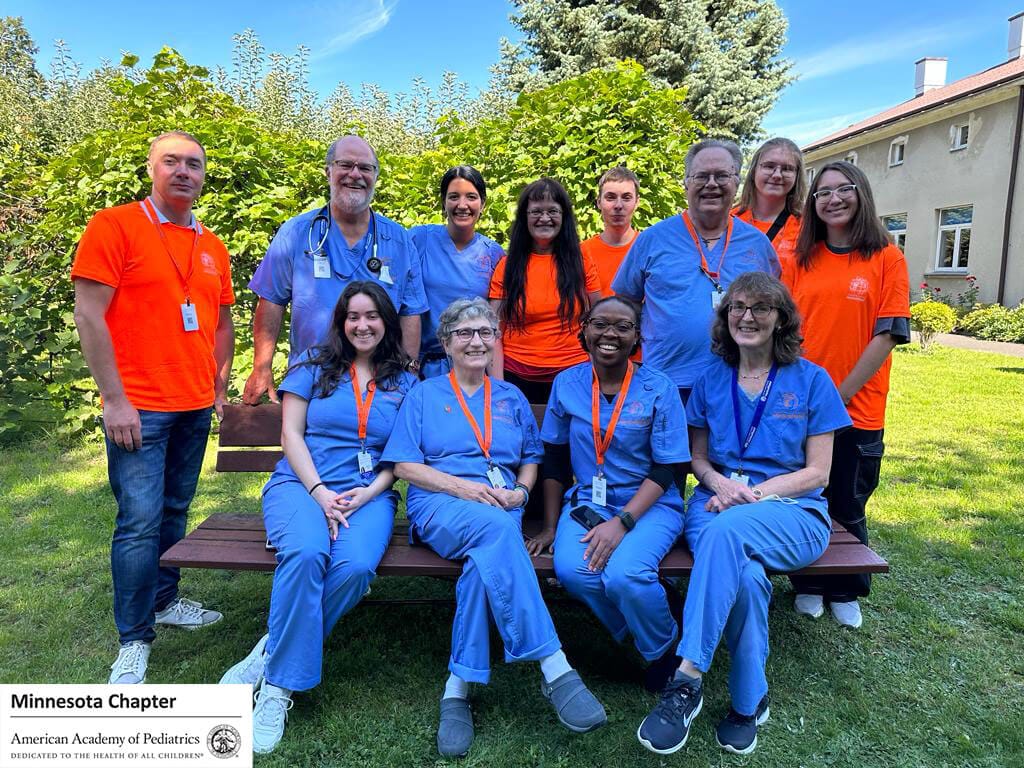
On December 10, 2022, the American Academy of Pediatrics (AAP) Minnesota Chapter, in partnership with International Medical Relief (IMR), provided critical pediatric care to over 400,000 Ukrainian refugee children in Poland. This effort was a part of the ongoing Ukraine Medical Relief initiative, which focused on addressing the healthcare needs of displaced women and children during the conflict. Among the diverse team of medical professionals, we were fortunate to have a pediatric ophthalmologist who played a key role in assessing and treating visual impairments, a critical need in the refugee population.
Additionally, Zosia, a dedicated IMR staff member and a Yale University graduate, contributed significantly to the mission. Having completed a year-long internship with IMR prior to attending the University of Chicago Medical School, she was instrumental in guiding the AAP team of 12 volunteers, under the leadership of Lana. The team worked tirelessly over the course of a week, delivering focused pediatric care to Ukrainian refugee children in Poland.
IMR launched its services in Warsaw, Poland, within days of the outbreak of the conflict. The majority of patients we served were women and children, as many of the men remained in Ukraine to support the defense efforts. Recognizing the urgent need for pediatric expertise, IMR made it a priority to recruit pediatricians early in the response. By 2022, IMR had successfully mobilized 622 volunteers, including numerous pediatric specialists, to provide care in Poland and surrounding areas.
The sheer scale of the crisis required unprecedented coordination and effort. Over 400,000 children were treated in 2022 alone, some arriving with only a grandparent or being sent alone on buses by their parents to ensure their safety. The challenges faced in this humanitarian crisis reinforced the critical role pediatricians play in such global relief efforts. Pediatricians are not only tasked with treating acute illnesses and injuries but also with addressing the long-term developmental and psychological needs of displaced children, many of whom have endured immense trauma.
The collaboration between AAP Minnesota and IMR is a testament to the power of medical professionals coming together to provide life-saving care in the most difficult circumstances. Pediatricians remain at the forefront of this mission, offering both medical expertise and compassionate care to the most vulnerable.
Caring for Pediatric Patients with Ichthyosis: Lessons from 10 Years of Medical Missions
During our first medical mission to Koh Rong, Cambodia, the IMR team encountered two siblings diagnosed with ichthyosis, a rare and severe dermatological condition. The absence of treatment options in their remote village prompted IMR to assume full responsibility for their ongoing care, which has evolved over the past decade.
Understanding Ichthyosis and Its Multisystem Impact
Ichthyosis is a genetic disorder characterized by the accumulation of dead skin cells, leading to thickened, dry, and scaly skin. The condition poses significant challenges, particularly in pediatric patients, and can lead to serious complications in other areas, including ocular health.
For the past 10 years, IMR has engaged expert providers and consultants, delivering comprehensive treatments including topical therapies and medications, to manage the children’s skin condition. Our primary focus has been the preservation of ocular function, which is commonly affected by the disease.
Ongoing Monitoring and International Collaboration
Our care for the siblings has involved regular visits and close collaboration with local government partners from Sihanoukville, combined with research efforts based in the United States. By integrating international expertise, IMR has developed evolving care protocols for ichthyosis, addressing both dermatological and ophthalmological complications.
Each IMR medical mission team has played an essential role in enhancing the children’s care, resulting in interventions that have successfully preserved their vision, demonstrating the critical importance of multidisciplinary approaches to rare conditions like ichthyosis.
Ocular Complications in Pediatric Ichthyosis Patients
Ocular involvement is common in ichthyosis, where the disease compromises eyelid tissue and prevents complete eye closure, putting patients at high risk for vision loss. Early in our care, we implemented lubricating eye ointments and drops to manage these risks. However, over time, the boy developed strabismus, with his eyes turning downward toward his nose, indicating the need for surgical intervention.
Surgical Intervention: A Case Study in Collaborative Care
IMR sought the expertise of a U.S.-based surgical team, coordinating a complex procedure abroad to address the boy’s ocular complications. We facilitated his surgery in Vietnam, where his eyelids were grafted to prevent further damage. This surgical solution, combined with a long-term care plan, has significantly improved his visual prognosis while mitigating the progression of skin deterioration.
Key Learnings for Pediatric Care
This case underscores the importance of early intervention and multidisciplinary collaboration in managing rare genetic disorders. The involvement of both dermatological and ophthalmological expertise is essential in addressing the multisystem effects of ichthyosis. Pediatricians, dermatologists, and ophthalmologists working together can significantly improve long-term outcomes for patients with similar conditions.
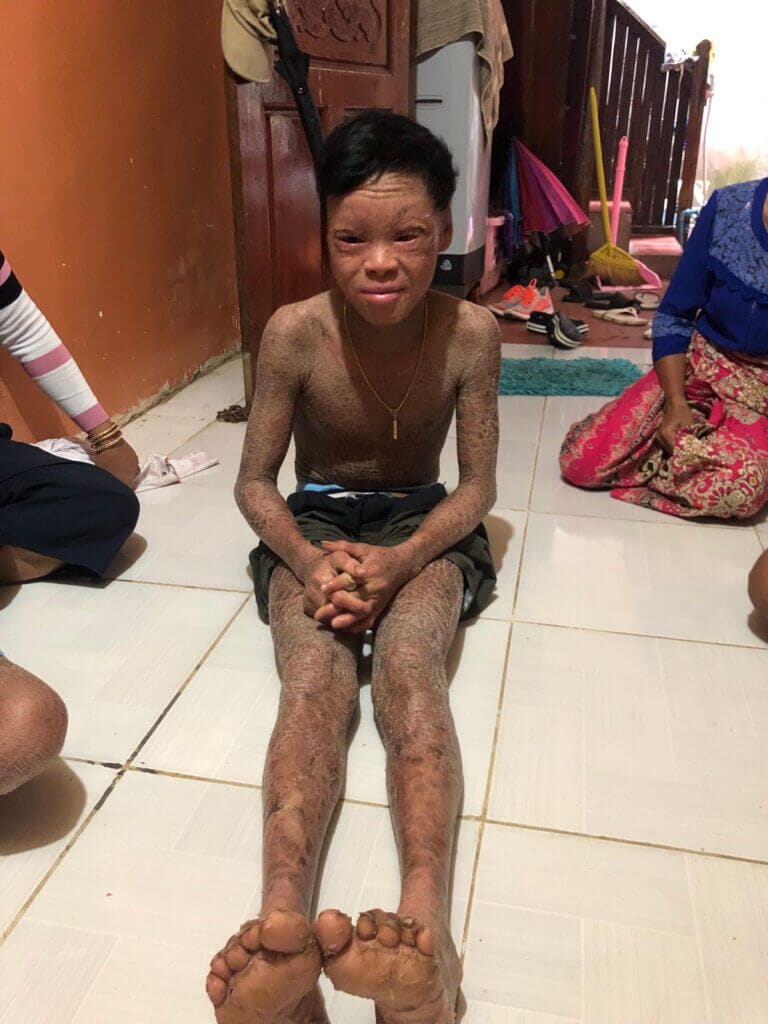
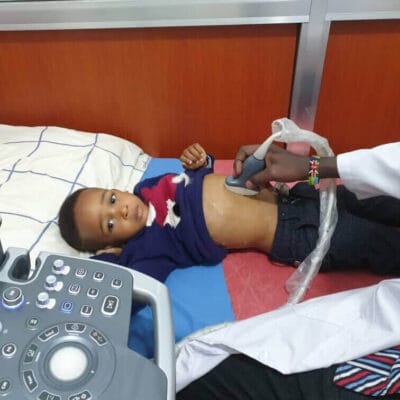
Liam’s Journey: A Triumph over Neuroblastoma
During a routine checkup at an IMR village clinic in Tanzania, volunteer physicians identified something concerning about Liam, a young boy from a remote village. Further diagnostic workup in a city hospital revealed a life-threatening condition, neuroblastoma, a rare pediatric cancer that develops from immature nerve cells. It was a critical discovery, but thanks to the quick action and expertise of IMR and its supporters, Liam’s life took a turn for the better.
IMR was able to fund Liam’s treatment through generous donations designated for critical medical needs. The medical team referred Liam to Oltrument Hospital in Arusha District, where a comprehensive diagnostic workup was initiated. Initial investigations revealed microcytic hypochromic anemia with hemoglobin (Hb) levels as low as 6.3g/dL and signs of a right renal mass. IMR’s local doctors ruled out sickle cell disease through a sickling test, and after further laboratory tests, Liam’s anemia was found to be secondary to iron deficiency. However, the most alarming finding came from an abdominal ultrasound, which revealed a right renal tumor, later confirmed as neuroblastoma, through a CT scan.
IMR’s commitment to Liam’s care led to the initiation of chemotherapy on November 25, 2023, followed by blood transfusions to stabilize his hemoglobin levels. As Liam continued his chemotherapy regimen, IMR’s team also explored the option of national health insurance for him, which was successfully arranged in early December.
Liam’s progress was steady and encouraging. On December 10, he was seen playing football with friends, a heartwarming sign of recovery. However, his treatment journey was not over. By January 2024, he had undergone multiple rounds of chemotherapy, with each cycle improving his condition. He was even able to return to school by January 22, a remarkable achievement for a boy who had been critically ill just a few months prior.
In February, further challenges emerged when Liam’s weight began to drop, and his neutrophil count fell, delaying chemotherapy. IMR’s doctors quickly administered Granulocyte Colony-Stimulating Factor (G-CSF) to boost neutrophil production, allowing him to resume treatment. His resilience showed through each step of the way, even as he faced complications like a minor injury sustained at school.
On April 19, 2024, Liam underwent the definitive surgery to remove his tumor, and the postoperative results were promising. He continued to receive follow-up care, and by June 3, a bone marrow biopsy confirmed the most incredible news: Liam was cancer-free!
With IMR’s ongoing support, Liam began radiotherapy in June to ensure any remaining cancer cells were eliminated, completing the treatment by July 28. His family, deeply grateful, described the experience as nothing short of miraculous. Liam’s journey from a critical diagnosis to recovery is a testament to the power of early intervention, expert care, and the generosity of IMR donors.
A Note of Gratitude
Liam’s family has expressed their profound gratitude to IMR and its network of supporters for the lifesaving care their son received. “We are eternally grateful for the support, dedication, and love shown to Liam,” his parents said. “Without IMR, we don’t know what we would have done. Our family is truly blessed.”
Liam’s case underscores the importance of early cancer detection, access to comprehensive treatment, and the life-changing impact of global health initiatives. His story is a beacon of hope for other families facing similar battles, and a reminder of the importance of organizations like IMR in providing medical care to underserved communities.
Continuing Support and Future Care
In addition to Liam’s medical care, IMR has provided ongoing support for his family. To further enhance local healthcare capabilities, IMR purchased a brand-new Butterfly ultrasound device for the medical team in Tanzania, ensuring faster and more accurate diagnostics for patients in the region. IMR also continues to cover the family’s health insurance and will remain involved in Liam’s ongoing medical care, ensuring he receives the treatment and monitoring he needs for a healthy future.
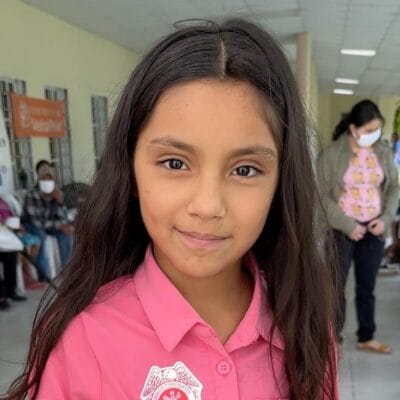
Collaborative Pediatric Care through Medical Missions in Honduras
Patient Case: Ms. Mari, a young patient from Honduras, visited our IMR clinic where she was evaluated by Dr. Arguello, one of the mission’s pediatricians from Colorado. Upon examination, Dr. Arguello identified a defect in Ms. Mari’s left groin that required further medical intervention.
Collaborative Care: Within a week of the initial diagnosis from Dr. Arguello, IMR’s local host, Nellie, utilized her extensive contacts within the local healthcare network to ensure that Ms. Mari received the necessary care. She was promptly referred to Dr. Ochoa, a local specialist, for further evaluation and treatment. Nellie’s quick coordination with local resources exemplified the seamless integration of IMR’s network with regional healthcare services.
Dr. Sheldon Berkowitz,
Pediatrician, MD, FAAP
“Participating in a pediatric medical mission with International Medical Relief was an experience that profoundly transformed my perspective as a healthcare provider. I’ve worked in underserved areas before, but this mission to support children and families fleeing war-torn Ukraine was unlike anything I’ve encountered. The gratitude and resilience of these communities were deeply moving. Some of my most rewarding moments were spent connecting with the children beyond just providing medical care. I’ll never forget a three-year-old boy, dressed in a tiny cardigan, who quietly clapped along as I played my travel guitar. It reminded me that medicine is so much more than solving medical problems—it’s about bringing comfort, hope, and a sense of normalcy to those who need it most.
IMR’s dedication to creating sustainable health solutions and providing compassionate care, even in the most challenging conditions, is unparalleled. Despite dealing with a chickenpox outbreak and witnessing families torn apart, I was inspired by the strength and perseverance of the children we served. This experience reaffirmed my belief in the true power of medicine to change lives. I encourage every healthcare professional to embark on a mission with IMR—it’s a journey that will reignite your purpose and remind you why you chose this path in the first place.”
— Dr. Zachary, Pediatrician
Pediatric and Ophthalmology Care in Puerto Rico
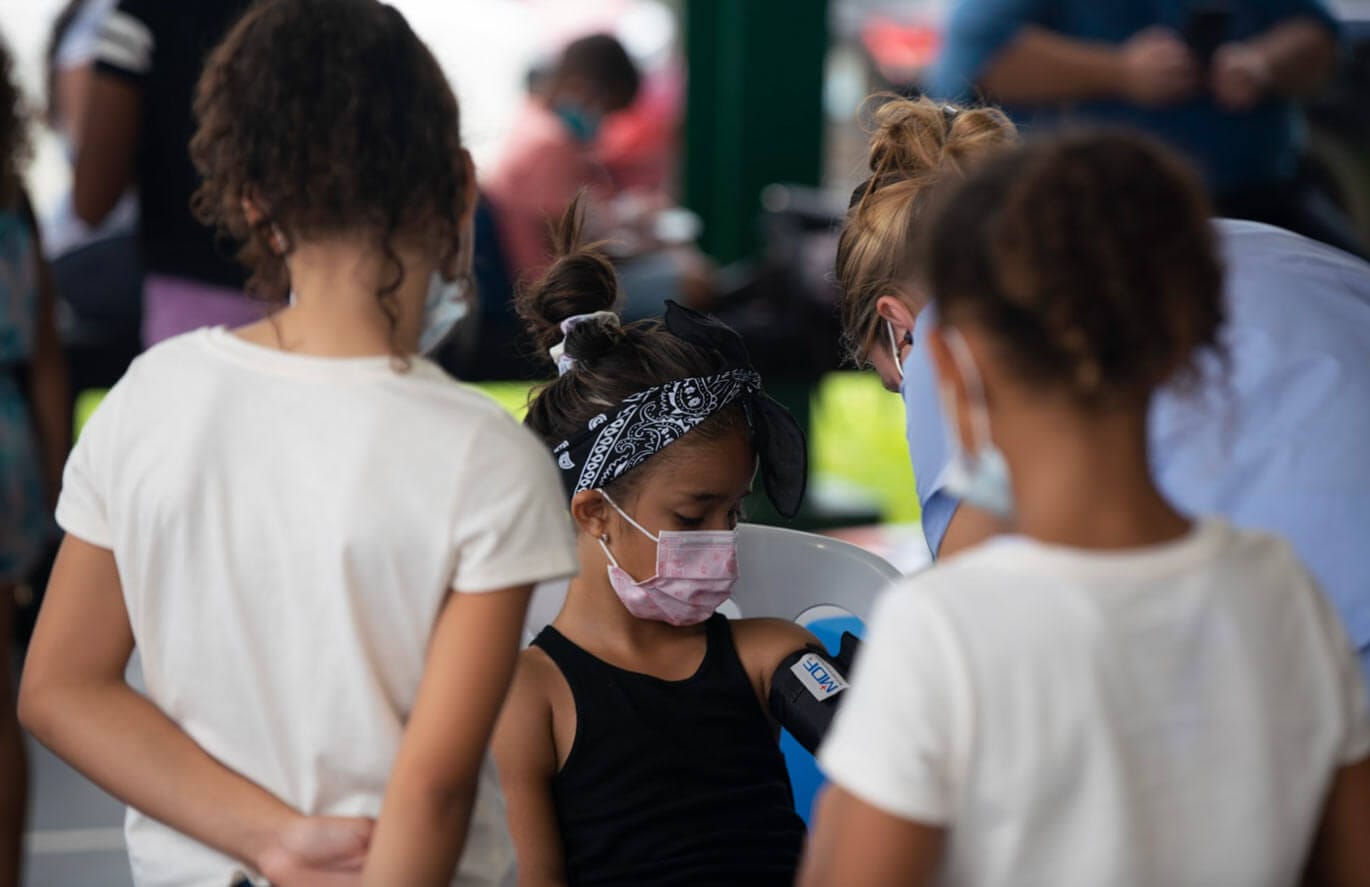
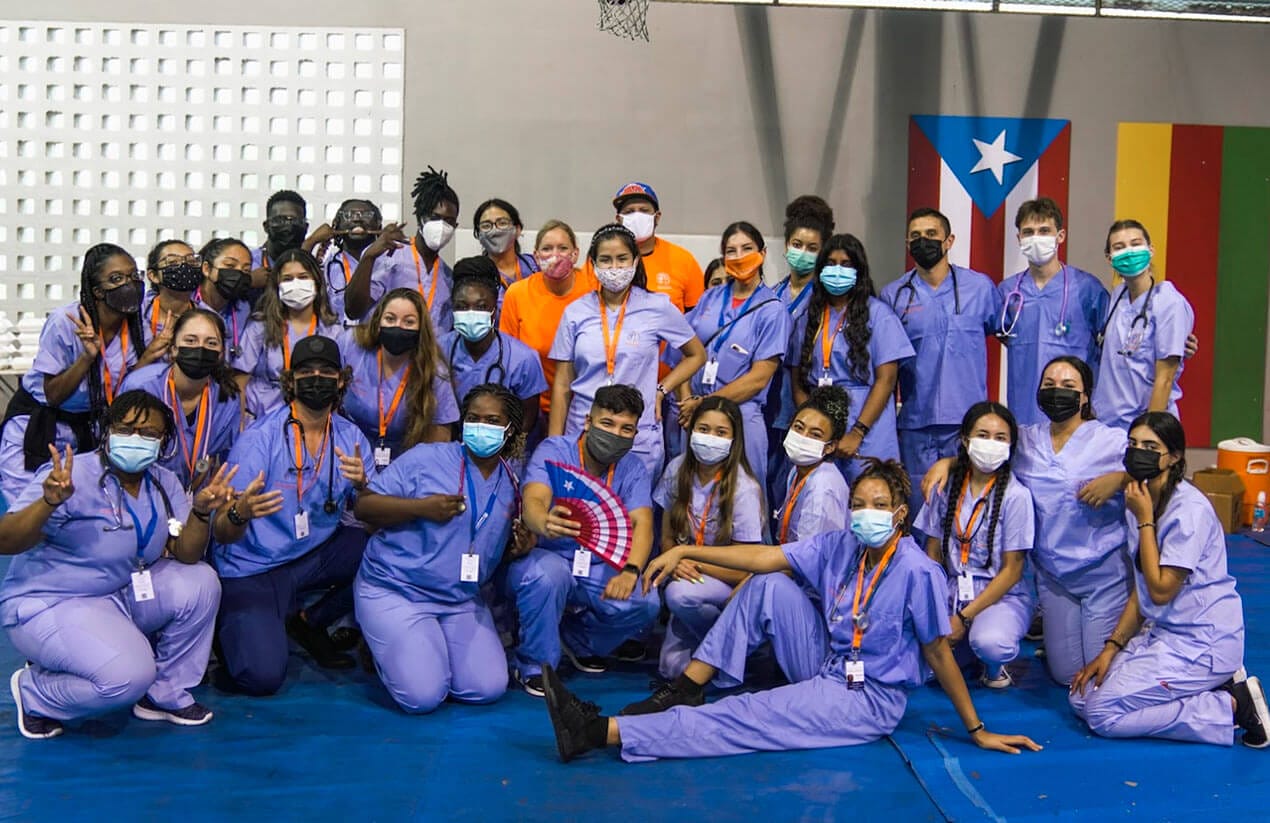
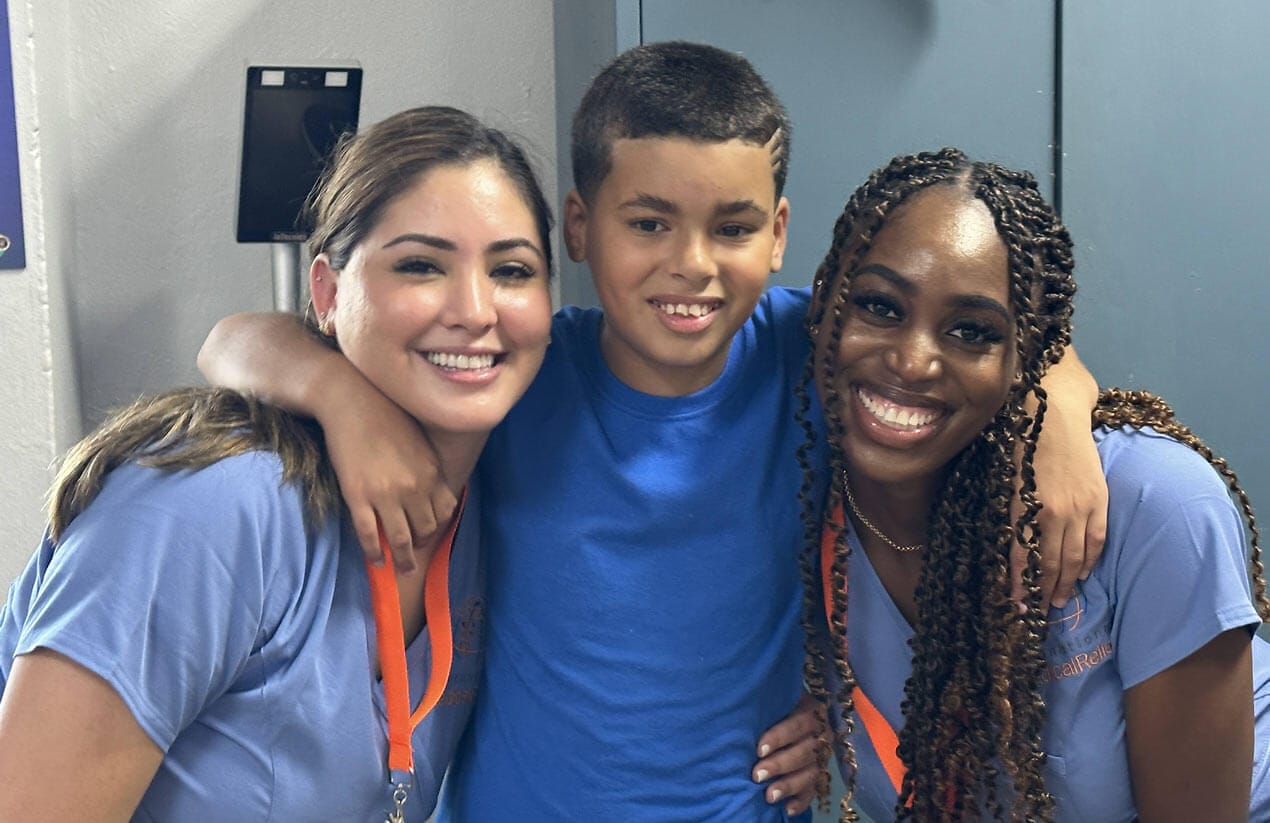
Since 2021, International Medical Relief (IMR) has been a beacon of hope for the youth of Puerto Rico. Through partnerships with organizations like the YMCA, Boys & Girls Club, and the Gogo Pediatric Foundation, IMR has carried out 33 global brigades, bringing critical healthcare and preventative education to thousands of young people across the island. These missions, supported by university collaborations with NOVA Southeastern University and FAU Florida Atlantic University, have allowed IMR to provide comprehensive medical care, including pediatric and ophthalmology services, to those who need it most.
One of these missions took place in the heart of San Juan, where a team of dedicated healthcare professionals set up a clinic in a community center. Children and young adults, some traveling from remote areas, lined up for a chance to receive medical attention they had been without for too long. The IMR team, armed with specialized knowledge and a deep passion for service, conducted thorough pediatric examinations and eye screenings.
Among the many children they saw that day was a shy 8-year-old girl named Isabella. Her mother explained that Isabella had been struggling in school because she couldn’t see the board clearly, but they couldn’t afford an eye exam, let alone glasses. The IMR ophthalmologist performed a detailed eye exam and diagnosed her with nearsightedness. Thanks to donated glasses, Isabella was fitted with a pair right there in the clinic. The smile that spread across her face when she could finally see clearly was a moment of pure joy for everyone present.
Meanwhile, in the pediatric section, a young boy named Mateo, suffering from chronic asthma, received an updated treatment plan. His mother expressed immense gratitude as the IMR team provided not only medication but also education on managing his condition. The personalized care and attention made all the difference, giving the family the support and confidence they needed to navigate his health challenges.
For the healthcare providers involved, these missions are more than just clinical work—they are a testament to the resilience of the human spirit and the profound impact that compassionate care can have on communities in need. Each visit, each patient, each smile reaffirms the purpose of their mission: to bring health, hope, and healing to every child and family they encounter.
Through their continued dedication, IMR and its partners have built a lasting relationship with the people of Puerto Rico, empowering youth and families with the knowledge and resources to lead healthier lives. These missions are not just about providing care; they are about creating a brighter, healthier future for an entire generation.
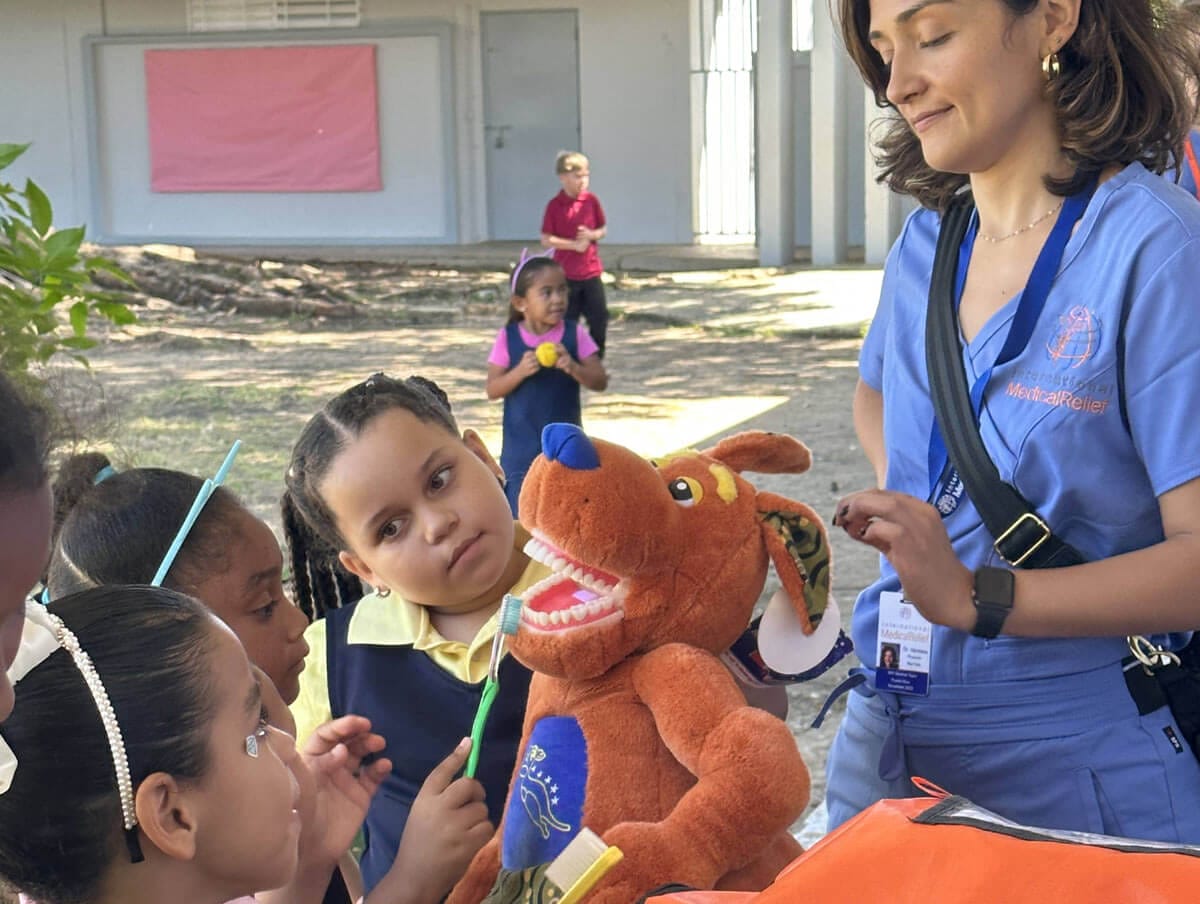
Join Us in Making a Difference.
You can join an IMR medical mission team or donate today!




